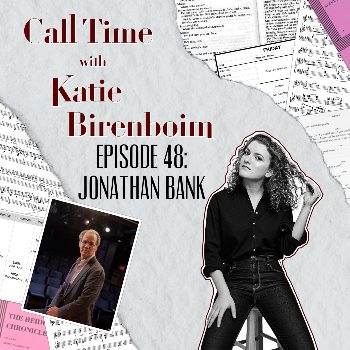
I couldn’t be more thrilled that for my first podcast episode under the guise of Arts Journal I interviewed Artistic Director and Producer of the Mint Theater Company, Jonathan Bank. For those who are unfamiliar, the Mint has a long history in New York City’s Off-Broadway scene mounting what’s called “lost,” or forgotten, plays. Former NY Times chief theatre critic Ben Brantley, a previous guest on the show, called the theater the “resurrectionist extraordinaire of forgotten plays.” And indeed — the production history of the Mint looks unlike any other in the country: you see names like A.A. Milne (you think to yourself: didn’t he write Winnie the Pooh?), Edith Wharton (hey — I didn’t know she wrote plays!), D.H. Lawrence (ditto), and many that are relatively unrecognizable, like Miles Malleson, Harley Granville Barker, Hazel Ellis, or Elizabeth Baker. In our conversation, Jonathan and I go deep into this unique theatrical mission: Why old plays? What’s relevant about them today, and what makes them attractive to contemporary audiences? Is it about what I refer to as “the trappings of history” — the way a character would have worn his tie, the specific pattern on a piece of embroidery, the exact, British inflection of the word “clerk” (think about it) — or is it something more, something deep about the way early twentieth century plays tell stories? (Hint: your knowledge of Classical Greek philosophy may come in handy for this discussion…).
Clearly, Jonathan is an Artistic Director unlike most: he is an historian as much as he is a director, a dramaturg as much as he is a producer. In fact, the Mint’s prestige on the NY theater scene — winning an Obie Grant, a special Drama Desk award, and countless Lortel nominations — is in many ways synonymous with Jonathan, and his personal artistic drive. The late, great Terry Teachout described him as “one of a handful of theater artists in America whose name is an absolute guarantee of quality.” And this is not only because of Jonathan’s excellent work and eye for uncovering the best of American, British, and Irish drama, but also because of his ability to be, as he calls it, a “jack of all trades.” Jonathan and I get into the nitty gritty of what that means when running a NY theatre company with only one other full-time employee: the historical research, yes, but also the grant workshops, the raising of money, the outsourcing, the press relationships, and how all that is changing. As the industry continues to stumble along post-shutdown (perhaps there’s a post to come about the closing of The Music Man), it’s my belief that small theater companies will only be able to survive with the nimbleness, flexibility, and absolute dedication to mission that the Mint exemplifies.
And while I am certainly biased — I worked with the Mint this summer on Elizabeth Baker’s 1909 play, Chains — I feel strongly that a company like the Mint must continue to entertain NY audiences. As someone who has focused much of my academic and written work on the subject of old musicals (whether and how we can mount them today), the production of older plays, specifically ones that often have never been produced in the United States before, is compelling. As Jonathan says throughout our interview, “the world hasn’t changed as much as we think,” and there’s something special about the curtain going up on a rediscovered play that combines the experience of engaging with a new work with the realization that the characters you’re watching, though speaking and dressing in ways that appear unfamiliar, aren’t so different from you or me.
Jonathan and I go in depth about all this and more in our full interview, discussing CETA grants of the 1970s, ignoring phone messages, doing theatre in high school because you harbor a crush, the dramatic richness of the Edwardian period, the writing of Stanislavsky, tik tok, female playwrights, theatre’s competition with the couch, and Michael Kaiser’s theories of artistic production. Listen here, or on any preferred podcast platform.


Brilliant essay! Loved the podcast! What an interesting man—-so different from outgoing very young thespians!
Also took the opportunity to listen to your last podcast, since we had missed it! Very different from this last guest! Very young and ambitious and confident!!!